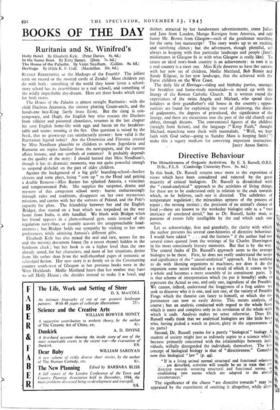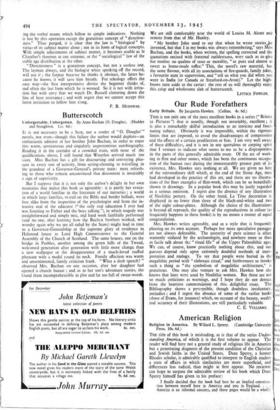Directive Behaviour
The Directiveness of Organic Activities. By E. S. Russell, O.B.E. D.Sc., F.L.S. (Cambridge University Press. 8s. 6d.)
IN this book, Dr. Russell returns once more to the exposition of views which have been considered and rejected by the great majority of critical biologists. Dr. Russell is dissatisfied with the " causal-analytical " approach to the activities of living things, for these are to be understood only in relation to the ends towards which, so he believes, each one is directed. The subtleties of temperature regulation ; the miraculous aptness of the process of repair ; the nesting instinct ; the precision of an animal's choice of food ;—these are known to the workaday biologist only as a " vast intricacy of unrelated detail," but to Dr. Russell, lucky man, as patterns of events fully intelligible by the end which each one serves.
Let us acknowledge, first and gratefully, the clarity with which the author presents his several case-histories of directive behaviour. I would have added " . . . and the fairness " if the author had not several times quoted from the writings of Sir Charles Sherrington in his more consciously literary moments. But that is by the way. The central faults of Dr. Russell's approach seem to the average biologist to be these. First, he does not really understand the scope and significance of the " causal-analytical " approach. It has nothing to do with likening organisms to machines, nor does it do the organism some secret mischief as a result of which it ceases to be a whole and becomes a mere assembly of its constituent parts. It is that scheme of interpretation which (to put it broadly) seeks to represent the Actual as one, and only one, ingredient of the Possible. We cannot, infieed, understand the froggyness of a frog unless we seek to discover why it is one, and just one, of the variety of Possible Frogs which the theorist can fancy to himself, or which the ex- perimenter can now so easily devise. This means analysis, of course ; but an analysis conducted with regard to the whole from which it starts and complete only in its revelation of the whole with which it ends. Analysis makes no sense otherwise. Does Dr. Russell really think that we analytical biologists are like little boys who, having picked a watch to pieces, glory in the separateness of its parts? Second, Dr. Russell yearns for a purely " biological " biology. A student of society might just as tediously aspire to a science which; because primarily concerned with the relationships between indi- viduals, wilfully disregarded the individuals themselves. The key concept of biological biology is that of " directiveness." Consider now this biological " law " (p. 44).
" If in a living animal normal structural and functional relations . . . are disturbed, activities will usually be set in train that are directive towards restoring structural and functional norms, 01 establishing new norms which are adapted to the altered circumstances."
The significance of the clause "are directive towards" may be appraised by the experiment of omitting it altogether, while alter-
ing the verbal nouns which follow to simple indicatives. Nothing is lost by this operation except the gratuitous concept of " directive- ness." Thus purged, it is clear that the law is " biological " by virtue of its subject matter alone ; not in its form of logical concepts. With simple adjustments of subject matter, it becomes usable as le Chatelier's theorem at one extreme, or the " sociological " law of the stable age distribution at the other.
" Directiveness " is a gratuitous concept, but not a useless one. The layman always, and the biologist when speaking off the record, will use it ; the former beca'ise he thinks it obvious, the latter be- cause he knows it will save him breath. For teleology offers the easy way—the first interpretative device the beginner thinks of, and often the last from which he is weaned. So it is not with irrita- tion but with envy that we watch Dr. Russell clattering down the line of least resistance ; and with regret that we cannot accept this latest invitation to follow him along.
P. B. MEDAWAR.



























 Previous page
Previous page